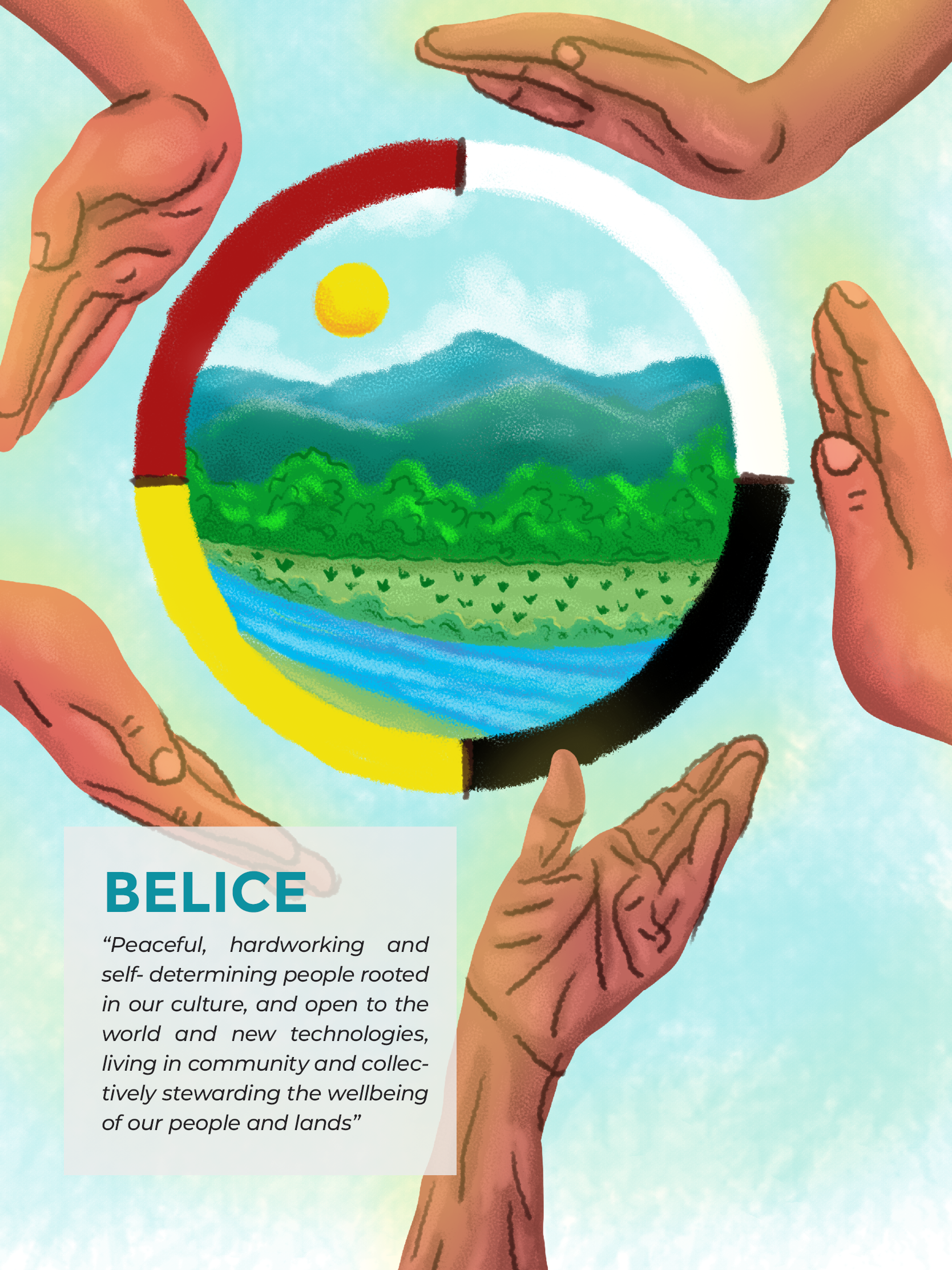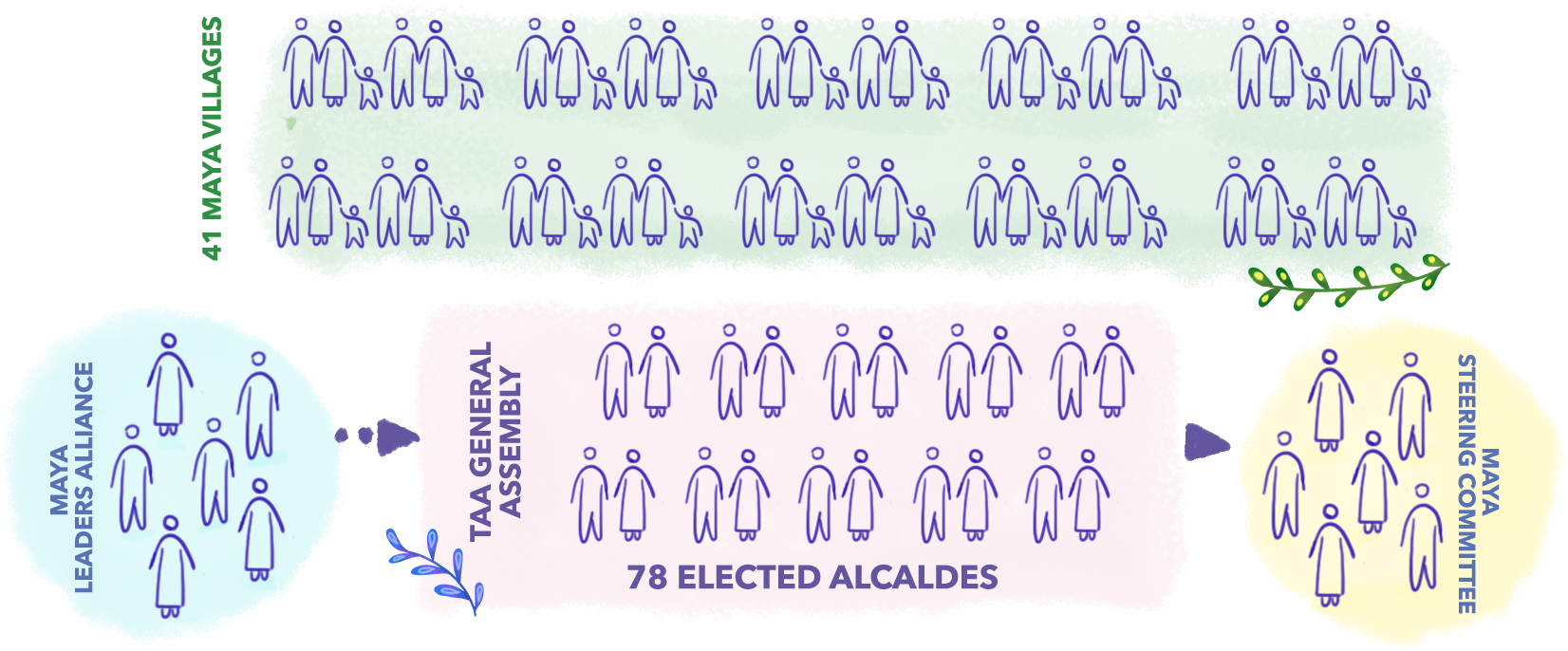7 BELICE

The Belize presentation was by Pablo Miss, Program Director Julian Cho Society-Maya Leaders Alliance.
The Future We (Maya Dream)
A fundamental aspiration of our peoples is to be and to be well: we are creators of our own future. Some key elements that have helped us as a people to advance in our emancipatory process: a) we are Maya and we have to act as the Maya People; b) our territory includes a significant part of southern Belize; c) we are the children of the land, but we also suffer constant confrontations from other groups who want to control our lands; d) we are convinced that if we do not protect our lands, we will stop being Mayas.
These principles were established, as a means to allow the sharing of desires as the Mayan people, the desire is to use the system of the colonizer so that they agree with our own vision as Mayan Peoples.
We start from the principle that it is essential to defend our rights. In the judicial processes that have been promoted by the Mayan people, they are convinced that regardless of the results in the courts, they will continue to defend their lands.
Experience of the process in the Inter-American Commission on Human Rights (IACHR)
In practice, in terms of its domestic legal system, the Belizean government considers the IACHR as an extra-territorial entity, and therefore its resolutions are usually not complied with. For this reason, the country’s Supreme Court of Justice was appealed to and, when ruling on our case, it recommended that other communities in the region should be included in the petition.
Response of the Supreme Court of Justice of the country
During 2010, the Supreme Court recognized the territorial rights claimed by the communities, and since then this decision has allowed the Mayan people to exercise their autonomy and control over their lands.
The Court’s decision established that customary tenure rights exist and that therefore the right to collective property of Indigenous Peoples must be respected by the State. And it also ordered the demarcation of indigenous lands claimed by our peoples, and that, with respect to mining extraction plans, the State must consult the Peoples in whose territories there are extraction targets. In other words, the decision of the Supreme Court protects tenure and security over the Maya Indigenous lands.
Position of the Government of Belize
The government appealed the Supreme Court ruling (in 2015) and the decision was rectified. Since 2017 the case continues in the Supreme Court, awaiting a decision in their favor by the Mayan people.
The government has offered negotiation to the authorities of the Maya people, but the elders say that, even if we negotiate, we must attend to the decision of the Supreme Court once it is pronounced. That is to say, the elders of the Mayan people are in favor of a negotiation, but supported by the justice system and endorsed by the decision of the Supreme Court of the country.
The Mayan people are guided by the wisdom of their elders, this is an important principle in the fight for the right to self-determination.
Reflections learned during the process for the Maya people
- The process of access to the Supreme Court tends to demobilize. It is long and expensive and the government knows that, which works in its favor.
- We have the land, but we need to equip ourselves with effective mechanisms to protect it. And for this we need self-governing institutions that help us for that purpose.
- We do not forget that we are in constant conflict with the colonial systems and structures of government and domination. And this system is expressed primarily in relation to control over land. When they take over the land, they take away our ability to continue occupying the territory and restrict us to a reservation system.
The Maya System of Indigenous Governance
The Mayan indigenous government system allows to advance visions and futures as Peoples; to protect the right to self-government and to be able to be. And to achieve this they use international norms and standards, and those conditions the action of governments.
The Alcalde System
The Alcalde System is the Maya governance system, it is based:
- Maya Villages had the Alcalde system before the British, Spanish colony,
- Responsible for looking after the village and villagers,
- The responsibilities included-village meetings, resolve disputes, fahina, burial, looking after land and forest,
- Alcalde is one person, but it is not a personal office. Never act alone. Works the same regardless of who is elected. “I must ask the people”.
In 1988 it was decided to found a unified system of communities. This experience shows how Indigenous Peoples must adjust to changing realities.

The Maya Governance System – A novel innovation
The Belizean government does not recognize the power of this assembly of unified communities, it is right here where the collective power of our communities resides. While the Belizean government does not recognize this system, we are supported by international norms and standards.
Currently the fight and demand is for the government to recognize the Mayan system of government, however, this demand does not mean or propose that the government regulate or limit their autonomy.
The right to self-determination has to do with how our communities are able, collectively, to decide on these forms of control and presence of the government and non-governmental organizations in our territories, and demand that they respect our internal regulations and governance system.
Why are there Indigenous Peoples’ Movements around the world?
- To overcoming conditions of marginalization, discrimination and exploitation
- Forced to confront the legacy of colonialism and the structures that produce their marginalization and exploitation
- To carve a space for a dignified existence
Colonial Dispossessions: Land
- Land and care for the land are the foundation of how relate to each other and with the community
- Land as critical to identity, values and spirituality
Colonial Dispossessions: significance of Indigenous Governance
- Indigenous peoples are organized societies
- They have their own ways of organizing themselves, of managing their societies, managing their resources, resolving conflicts, maintaining peace and order, making decisions, and directing the course of their future.

